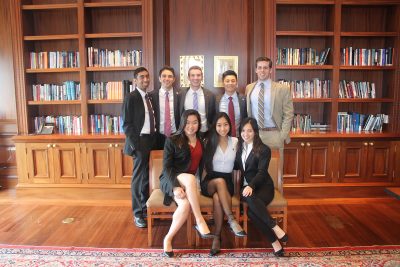
The Women’s March on Washington, among other rallies and protests, brought women’s rights and concerns about gender inequality into public discussion. Yet among students and young professionals, there is fear that these barely skim the surface of the issue and do not instigate substantial conversations about gender equality.
Eye2Eye, a service organization funded by the Alpha Kappa Psi business fraternity, hosted “Reaching New Heights: Gender Equality Transforming Today’s Corporate Ladder,” on Sunday at the Metcalf Trustee Ballroom in Boston University’s Questrom School of Business.
“Reaching New Heights” was Eye2Eye’s first move in their mission of combining research about gender issues with discussions among students and professionals.
Eye2Eye seeks to spread research opportunities and conference events across the country in the next five years, according to the organization’s president Nadav Hazan.
“Especially in Questrom, most of the people talking tend to be male,” said Hazan, a senior in Questrom. “I think people don’t understand the innuendo in gender inequality.”
Vanlizza Chau, director of operations at Eye2Eye, also noted the symbolism of the recently installed statue of the girl standing before the iron bull on Wall Street in New York, which was dedicated to inspire young women to enter finance.
Keynote speaker Karen Bressner, senior vice president of advertising sales for Z Living Network, applauded the attendees’ initiative in her opening remarks.
“I’m glad there are enough up-and-coming professionals concerned enough to hold a discussion on the topic,” she said.
Bressner shared some of the lessons she learned from working in a male-dominated field, setting the tone for the panel discussion that followed.
“It’s hard to make a difference when you’re young,” she said. “Now it’s a matter of doing what I can to get the message through. Always look at the glass half full.”
Eye2Eye’s research shows that women tend to put themselves at “disadvantageous” situations in both classrooms and the workplace, through “speech hedging” or apologizing before they’ve even spoken up, Hazan explained.
“We see that, even with students, gender determines how behavior plays into classrooms,” Hazan said. Eye2Eye recently began its first research project in conjunction with the BU mathematics department, studying male and female participation in the classroom, he explained.
Other panelists included Rachel Reiser, an assistant dean for the undergraduate program in Questrom, Courtney Suess-Raeisinafchi, a professor of hospitality administration in BU’s School of Hospitality Administration, and Gigi Wang, the CEO of Invoke Solutions, Inc., an online-based research events company.
Thomas Harwell, the director of student diversity initiatives in Questrom, moderated the conversation. He asked speakers about their experiences in the workforce, looking back on their careers to find where they began to work against perceived stigma or stereotyping in their respective fields.
In fact, most said they believed they had not realized that they had been working to break the glass ceiling until recently.
“You look backward and you realize you’ve been engaging in these conversations [about feminism and women’s rights] but not really naming it,” Reiser said. “I think millennials progress the idea of what women can be. Every generation pushes us forward.”
They also spoke on ideas and suggestions for solving gender inequality moving forward.
“One of the important things is to look beyond the workplace,” Wang said. “It takes a village, but look at inequality across the entire village.”
An audience as diverse as the speakers themselves, of about 45 students and young professionals, voiced concerns about today’s political climate before the conference.
“There is a definite gap between women in leadership,” said Sathvika Ramachandran, a senior in the BU’s College of Arts and Sciences. “It’s something I’m really passionate about and want to achieve in my life.”
CiCi Flanagan, a senior in Questrom, explained that until she received a job offer from a Memphis-based nonprofit in January, most of the challenges she experienced while looking for a job were ingrained as problems with her self-esteem.
“One of the humps of getting a job right out of college was owning up to my own self-worth,” Flanagan said. “It’s a challenge, but I’m willing to take it on.”
















































































































